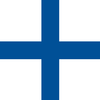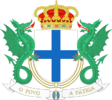Litoral
This article may require cleanup to meet MicroWiki's quality standards. |
| Motto: O Povo, A Pátria (Portuguese) "The People, The Homeland." | |
| Official languages | Latin (de jure) Portuguese (de facto) |
| Demonym(s) | Litoralese (Eng.) litoralês(a) (adj.) litorâneo(s) (Por.; masc.) litorânea(s) (Por.; fem.) |
| Government | Absolute monarchy |
• Monarch | Cristóvão |
| Legislature | Cortes Geraes |
| Establishment | 25 May 1974 (original) 25 May 2014 (restored) |
| Population | |
• Census | ~15 |
| Currency | Litoral real (de jure) Euro (de facto) |
| Time zone | UTC (WET) DST: UTC+1 (WEST) |
Litoral (Portuguese: /lituˈɾal/), officially the Kingdom of Litoral (Reino do Litoral; /ˈʁej.nu du lituˈɾal/), is a self-proclaimed sovereign nation more commonly referred to as a micronation located on the Iberian Peninsula, in southwestern Europe. It is surrounded by the Minho River which forms its borders with Spain to the north and Portugal to the south. Since its foundation, the de jure official language is Latin, however the de facto national and working language is Portuguese.
Etymology
The word litoral in modern Portugese can mean either "beach, coast" (as a noun) or "coastal" (as an adjective); both derived from the Latin lītorālis "of the seashore" (from lītus "shore"). The name was chosen to reflect the geographic location and insular basis of the nation.
History
Founded originally in 1974, Litoral claims to be one of the oldest nations in micronational history; indeed being established before the term and concept of "micronations". However, with decades of dormancy after its foundation, there is debate (even within Litoral) over whether the country can be considered to have been in existence since 1974. Despite this, the government of the kingdom officially recognises the 1974 date as the official date foundation.
Formation
After decades of one-party rule, on 25 April 1974 the Carnation Revolution took place in Portugal. This largely bloodless revolution overthrew the socially conservative, corporatist Estado Novo regime which had been in power since 1933.
Unhappy with the revolution and inspired by his love of medieval Portugese history and the foundation of his hometown of Vila Nova de Cerveira by King Denis of Portugal in 1321, Henrique Braga decided to breakaway from the "new" Portugal. At a Saturday afternoon picnic with friends and family, having discussed their uncertainity with political events, Henrique proclaimed the establishment of the Kingdom of Litoral exactly one month after the Carnation Revolution on 25 May 1974. The kingdom laid claim to the island of Boega and the nearby islands of Amores. He picked the islands partly because they are nearby and easily accessed, and partly because they are bordered by Spain where a conservative regime (of Francisco Franco) remained in place.
Braga delivered the formal declaration of independence in person to the President of the Municipal Chamber (the Portugese equivalent of a mayor) who, according to Henrique, took it seriously enough to report it to the National Republican Guard, the Portuguese gendarmerie. However, no further action came of this.
Henrique established the political and governmental structure of the kingdom through a series of charters that became known as the Articles of King Henrique (Artigos do Rei Henrique). They included (among other things): naming Christianity (specifically the Roman Catholic Church) the state religion; defining the make-up and appointment of the Royal Council; when and how a Cortes could be summoned; establishing the army; and establishing a judiciary.
Dormancy
Although Henrique maintained the kingdom for several years infrequently issuing new charters and ordinances, interest from friends and family, and even Henrique, eventually waned. In 1978, he took a job approximately 220 km away in Coimbra making visiting the island with friends and family all but impossible. By the time Henrique retired in 1986, Litoral was essentially dormant; although it was never declared to no longer exist. Nevertheless, Henrique et al had lost all interest.
Restoration
When Henrique died aged 90 in November 2010, it was several years before his son Fernando sold Henrique's house and organized his possessions. Upon doing so in late 2013, he rediscovered lost documents and items relating to Litoral. Fernando's own children (Henrique's grandchildren), Cristóvão and Anna, took an interest and prompted their father to take up the kingship of the micronation. Although he had fond memories of the Henrique establishing the kingdom, Fernando was reluctant to take on the micronation. Instead, he offered it to his son who showed the most interest and who was himself, like his grandfather Henrique, interested in history and politics. Therefore, on 25 May 2014 – the 40th anniversary of the foundation of Litoral — Fernando signed the Declaration of Abdication, formally renouncing the crown.
As king, Cristóvão took Litoral far more seriously than either his father or grandfather. He gave the micronation an online presence and recruited friends from university to help run and grow the country. He appointed a permanent Regal Council rather than impromptu councils as his grandfather did, and summoned Cortes far more frequently. Under Cristóvão's kingship, Litoral also began pursuing relations with other micronations for the first time, culminating in January 2021 with the kingdom signing its first international accord, the Friendship of Cooperation Treaty with the Kingdom of Hjemland.
Government and politics
This section is empty. You can help by adding to it. (September 2022) |
Law and order
This section is empty. You can help by adding to it. (September 2022) |
Military
This section is empty. You can help by adding to it. (September 2022) |
Demographics
Religion
Population
Languages
Culture
This section is empty. You can help by adding to it. (September 2022) |

